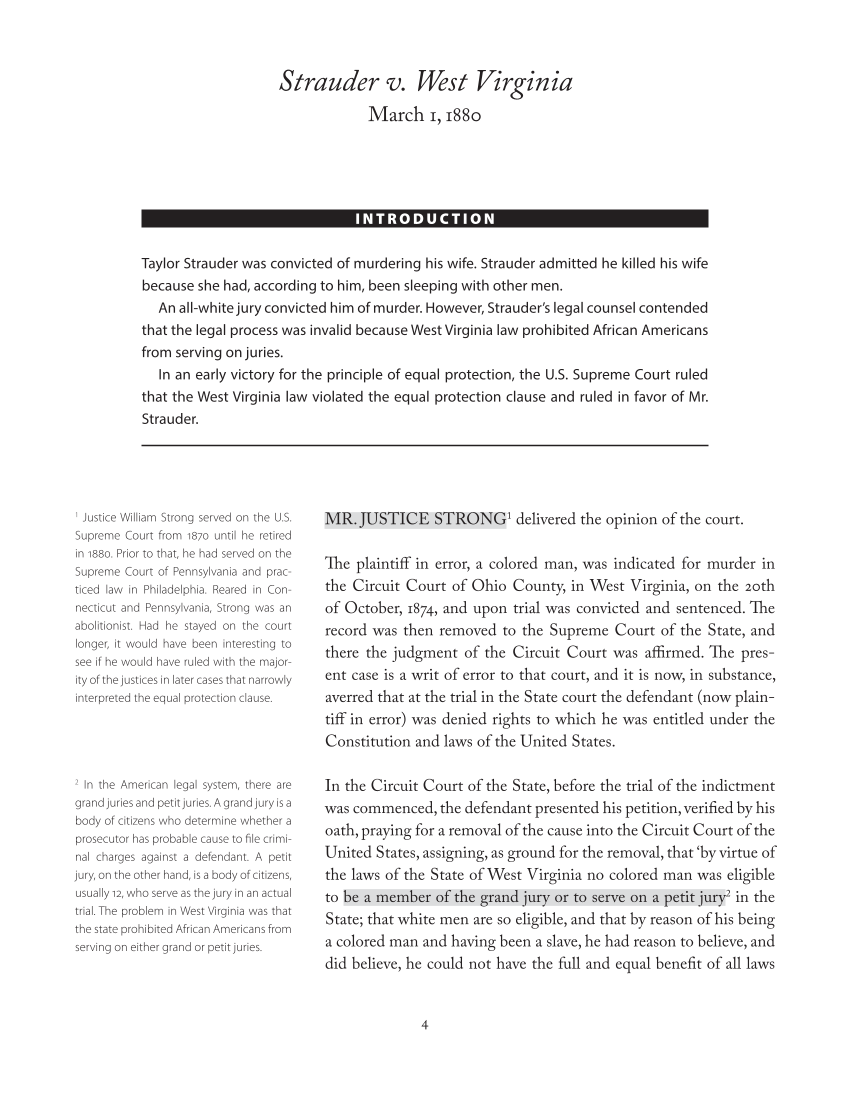4 MR. JUSTICE STRONG1 delivered the opinion of the court. The plaintiff in error, a colored man, was indicated for murder in the Circuit Court of Ohio County, in West Virginia, on the 20th of October, 1874, and upon trial was convicted and sentenced. The record was then removed to the Supreme Court of the State, and there the judgment of the Circuit Court was affirmed. The pres- ent case is a writ of error to that court, and it is now, in substance, averred that at the trial in the State court the defendant (now plain- tiff in error) was denied rights to which he was entitled under the Constitution and laws of the United States. In the Circuit Court of the State, before the trial of the indictment was commenced, the defendant presented his petition, verified by his oath, praying for a removal of the cause into the Circuit Court of the United States, assigning, as ground for the removal, that ‘by virtue of the laws of the State of West Virginia no colored man was eligible to be a member of the grand jury or to serve on a petit jury2 in the State that white men are so eligible, and that by reason of his being a colored man and having been a slave, he had reason to believe, and did believe, he could not have the full and equal benefit of all laws 1 Justice William Strong served on the U.S. Supreme Court from 1870 until he retired in 1880. Prior to that, he had served on the Supreme Court of Pennsylvania and prac- ticed law in Philadelphia. Reared in Con- necticut and Pennsylvania, Strong was an abolitionist. Had he stayed on the court longer, it would have been interesting to see if he would have ruled with the major- ity of the justices in later cases that narrowly interpreted the equal protection clause. 2 In the American legal system, there are grand juries and petit juries. A grand jury is a body of citizens who determine whether a prosecutor has probable cause to file crimi- nal charges against a defendant. A petit jury, on the other hand, is a body of citizens, usually 12, who serve as the jury in an actual trial. The problem in West Virginia was that the state prohibited African Americans from serving on either grand or petit juries. Strauder v. West Virginia March 1, 1880 I N T R O D U C T I O N Taylor Strauder was convicted of murdering his wife. Strauder admitted he killed his wife because she had, according to him, been sleeping with other men. An all-white jury convicted him of murder. However, Strauder’s legal counsel contended that the legal process was invalid because West Virginia law prohibited African Americans from serving on juries. In an early victory for the principle of equal protection, the U.S. Supreme Court ruled that the West Virginia law violated the equal protection clause and ruled in favor of Mr. Strauder.
Document Details My Account Print multiple pages
Print
You have printed 0 times in the last 24 hours.
Your print count will reset on at .
You may print 0 more time(s) before then.
You may print a maximum of 0 pages at a time.


































































































































































































































































